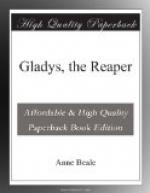‘I understand, Gladys,’ said Miss Gwynne. ’You are quite right. Let them all value you for yourself, and then we will introduce you as—’
‘I didn’t mean that, indeed, indeed, Miss Gwynne,’ said Gladys, her pale face growing red. ’I only wanted to show my gratitude, as I am, to them all. Perhaps even Mr Prothero may excuse me then, and—’
Here Gladys broke down again. She could not explain her own bewildered thoughts; but her friends understood her, and respected the honest pride that would be known, welcomed and beloved for merit, and not for a bettered position and condition. Miss Gwynne saw a vision of Owen in the background, with his handsome, honest, black eyes, and white teeth; but she did not mention what she saw.
‘At any rate, I must go and make the best of lame excuses,’ she said, ’and leave you in your new relationship, to dry your eyes, and learn to say “Uncle.” Such a pleasant name! I always longed for an uncle.’
Miss Gwynne returned to the drawing-room, and told Rowland that Mr Jones had been quite upset by the Welsh hymn that Minette had repeated, having known it under peculiar circumstances when he was young. She apologised for his non-appearance, and Rowland, seeing that something unusual had occurred, took his departure. She promised Minette a visit to the school, and prevailed on the little girl to allow one of the servants to put her to bed, instead of Gladys. Minette begged Miss Gwynne to let her say her ‘English prayers’ to her first, which she, of course, did.
Then Freda did her best to amuse Netta until Mrs Jones appeared, and said Gladys was quite ready to assist Netta, if she liked to retire for the night.
When Netta was in bed, Gladys joined her friends, and they discussed, more calmly than before, their newly-found relationship.
Gladys brought with her her Bible, in which her mother had written her name, and Mr Jones recognised his sister’s hand writing. She had also a lock of her mother’s hair, and her wedding-ring, and one or two other trifles, that drew fresh tears from a brother’s eyes.
Gladys said that she should like, for her own satisfaction, that a certificate of her mother’s marriage, and of her birth, should be obtained. Her mother was married, she believed, during the short time she was in Ireland; and she was born, she knew, in the parish where her father’s parents lived, to whose care her father had confided her mother. Two children had been born, and died before her birth, during the period that her parents were abroad.
It may be as well to say here, that the certificates were duly procured, through the clergyman of the parish, to whom Mr Jones wrote a statement of the case. Also that letters, written for the gratification of Gladys, to the Protestant and Roman Catholic clergy of her parent’s last neighbourhood were duly answered, and confirmed all that Gladys had said of them and of herself from first to last. This, of course, took some time to effect; but I have so far anticipated the event, to avoid fanning to it again.




